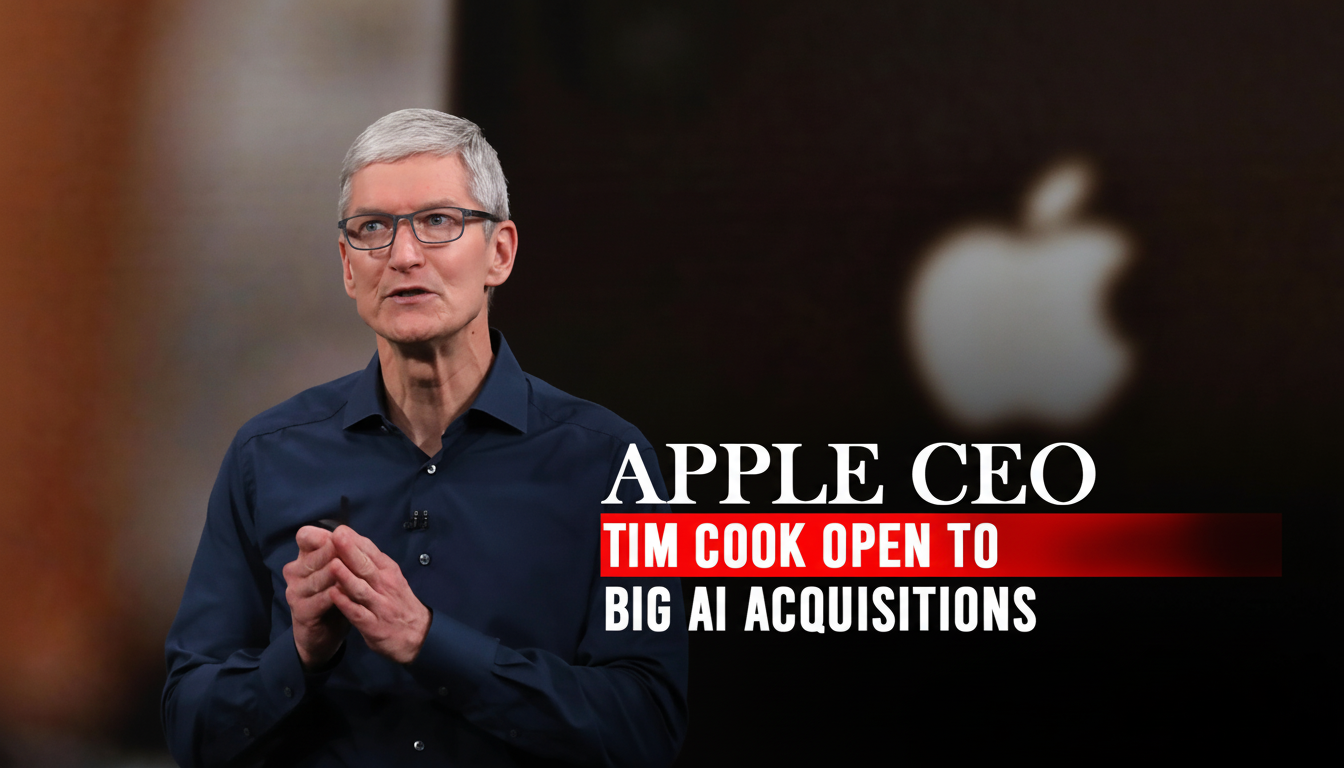Apple signaled a larger aperture for dealmaking in artificial intelligence, with CEO Tim Cook informing investors that the firm is welcoming acquisitions and partnerships to expand its AI roadmap. The communication reaffirms a pragmatic element of Apple’s AI strategy: building where it has a defensible advantage, collaborating where it elevates value, and purchasing if it significantly tightens gaps.
Cook signals mergers and acquisitions flexibility on AI
Pressed by analysts on Apple’s personalized AI approach, Cook restated that the firm continues to scan the market and would welcome opportunities in mergers and acquisitions to “advance its plans.” That assertion is compatible with Apple’s long-standing record of “tuck-in” acquisitions—the quiet purchases of technology and teams that quickly combine into fundamental platform software—rather than multibillion-dollar acquisitions that invite scrutiny from regulators and the public.

The balance sheet could finance either direction. Apple’s research and development expenditure has increased to over $30 billion each year, company reports suggest, and it has the wherewithal to bid for hard-to-find AI specialists, powerhouse companies, and data. Nevertheless, Apple’s organization indicates focused buying in areas that build on-device intelligence, data safety nets, and maker equipment atelier, rather than headline-chasing gambles.
Apple outlines a three-pronged artificial intelligence playbook
Cook laid out a framework rooted in three pillars: Apple’s self-developed foundation models, collaborations with third-party large language models, and select M&A. This plan is starting to come together. Apple Intelligence, a collection of AI systems introduced at its developer convention, unifies on-device inference with human intelligence.
Apple has even struck a deal with OpenAI to enable ChatGPT when desired in Siri and other system functionalities. Apple may seek more partnerships, Cook explained, emphasizing AI suppliers as plug-and-play components rather than one-size-fits-all solutions. It enables Apple to delegate jobs to the proper model while maintaining user optionality and privacy protections. Furthermore, this strategy has an impact since model value, cost, and safety maturity shift by quarter.
Under the bonnet, Apple ensures a future powered by a privacy-first design. Apple sends small models on Apple Silicon to perform many tasks locally, sending heavier workloads to Private Cloud Compute, a reliable, verifiable environment created for AI calculations with data safeguards. Portions of Siri queries are currently handled using the infrastructure, according to Cook, and the company is expanding its capacity. In a major supply chain comment, Cook announced that server production in Houston was underway for deployment in the Apple Intelligence data center. Apple Intelligence, from customized silicon to firmly controlled servers, allows it to remain competitive, outperform challengers, and improve security and stability in ways that public clouds cannot support at Apple’s scope.
Expect Apple to hunt where it can compound existing strengths. Likely targets include startups specializing in the following areas:
- Model compression and edge inference
- Multimodal perception (vision, audio, and context fusion)
- Privacy-preserving machine learning
- Agentic workflows tuned for personal context
Past acquisitions offer a blueprint:

- Siri
- Turi
- Xnor.ai
- Inductiv
- Vilynx
Bloomberg has reported Apple also brought in talent via the purchase of DarwinAI to bolster model optimization. Rather than chase general-purpose LLMs at any cost, Apple can buy focused IP that improves latency, battery life, and reliability on iPhone, iPad, and Mac—where it already controls the hardware, runtime, and distribution. That lock-in loop, powered by Apple Silicon, is difficult for rivals to replicate.
Competitive and regulatory context shaping AI dealmaking
The AI deal market is crowded and politicized. Microsoft’s deep alignment with OpenAI, Google’s investments in Anthropic and the work of DeepMind, and Amazon’s backing of Anthropic set the tone. Any large AI acquisition by Apple would invite scrutiny from U.S. and European regulators focused on competition and data stewardship. That makes Apple’s classic playbook—smaller, capabilities-driven buys—both tactically smart and strategically safer.
At the same time, Apple’s differentiated privacy stance could be a moat. By keeping sensitive context on device and escalating to verifiable cloud environments, Apple can pitch high-utility AI without the data exhaust that draws regulatory ire. It is a path that may prove attractive in regions with strict data rules.
Why it matters for users and developers across Apple platforms
Cook claimed Apple Intelligence is already helping to make purchase decisions and predicted that the effect would grow. With an installed base of more than two billion active devices, even small improvements to Siri and writing experiences such as dictation or image features count when measured across a market of billions of people.
As Apple adds new AI partners, users should expect more extensive model coverage for jobs like research, coding help, and inventive workflows, with clear consent spaces.
Developers should assume Apple will handle their technology the Apple way: integrating complex AI into system frameworks while ensuring access to premium third-party models. If procurements rapidly advance on-device execution or introduce innovative multimodal characteristic tiers, Apple’s API will revolutionize the system, and the applications that run on it will reflect those changes. In a year when the AI stack and the organizations that form it are transforming every month, Apple’s readiness to purchase what it requires is both a product approach and a company position.

